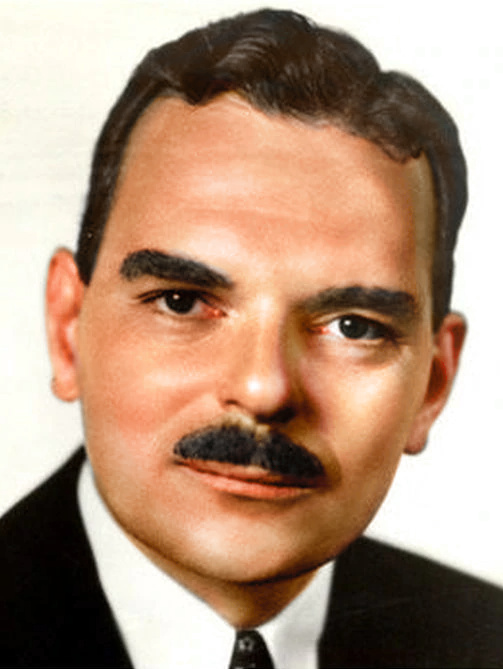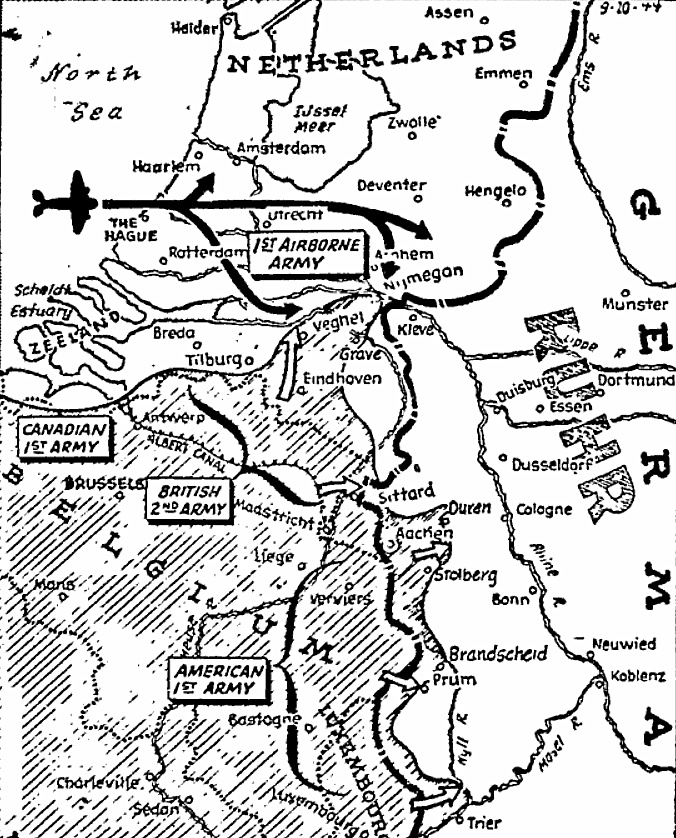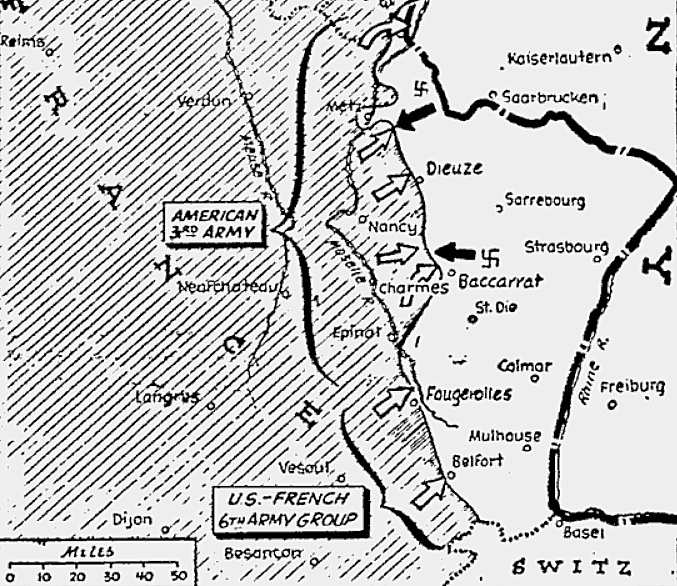It is with a warm and happy feeling that I come again to the great state of Oregon. It is a privilege to have the opportunity to thank you in person for the friendship your people have shown to me in the past and it is gratifying indeed to have been welcomed so cordially by your friendly and able Governor, Earl Snell.
Four years ago, when I spoke here in Portland, I pointed out the danger which I believe has now become apparent to all – the danger of one-man government in a free country.
At that time Mr. Roosevelt represented himself as indispensable to the peace of America. Now, four years later, he seeks a fourth term, for a total of 16 years as President, upon the claim that he is indispensable to the world. In the carefully supervised words of his own running mate, Mr. Truman, “The very future of the peace and prosperity of the world depends upon his reelection in November.”
Peace and prosperity are, of course, the objectives of both parties. My opponent claims to be indispensable to peace and prosperity. In other words, he claims that the United States and the world cannot get along without him. He has chosen this as the issue of the campaign. I accept the issue, and I challenge it.
Now let’s find out what are the essential elements of that peace and prosperity we all seek.
We know that victory in Europe is close at hand. Soon we shall be able to throw our full strength into the Pacific for the total, crushing defeat of the Japanese. If we in America are to do our share in helping to make secure the peace that will follow victory over both Germany and Japan, we must be a strong and united people.
The first requirements for peace and prosperity are unity in our government and strength and unity among our people. Is a fourth term indispensable to that?
The plain fact is that for 12 straight years, the New Deal has given this country a continuous demonstration of quarreling, dissension and disunity. It has set group against group, race against race, and class against class. Under this administration, business and labor have been set against each other and labor’s own house became divided.
We have listened without surcease to the shrill, abusive tirades of Mr. Ickes. We have heard Vice President Wallace recklessly denouncing unspecified Americans as Fascists. We have been treated daily to blow-by-blow accounts of innumerable feuds within the New Deal itself. You will recall the long quarrel between the Vice President and the Secretary of Commerce in which they publicly called each other “obstructionist” and “liar.”
Then, there was the long series of quarrels within the War Production Board – quarrels we now know to have been promoted by the New Dealers who have at length succeeded in taking it over. This running feud recently culminated in the resignation of several top officials of the WPB, while the head of the Board was shipped off to China by Mr. Roosevelt himself.
I do not believe in that quarreling, bickering kind of government – an administration which cannot unite its own house, even in war, can never unite the nation for the tremendous peace tasks ahead of us.
We must have the strength of unity within our government and among our people if we are to contribute to the building of a lasting peace. As a first step to that end, we must have a government in which the lines of responsibility are clearly laid down.
We must have the kind of an administration that inspires teamwork and devotion to the service of the country. I propose that we install that kind of administration next January 20.
The one dispensable thing to achieving this teamwork and devotion, this unity in government we have so long lacked, is a change from the indispensable man. With that new unity in our government, we will achieve the unity among our people so essential to the peace and prosperity of America and of the world.
Now there is a second thing that is essential to achieving our agreed objective of peace and prosperity. That essential thing is joint, harmonious action between the President and the Congress. Is a fourth term indispensable to that?
Every step we take in these critical years ahead must have the joint support of the Congress and the President. Can any such joint action and harmonious relationship be achieved under this administration?
It is a matter of common knowledge that the New Deal has continuously sought for 12 years to bring the Congress of the United States into popular disrepute. As a result, no bill which this administration can propose to Congress is today received with anything less than suspicion. The nation is now reaping the bitter fruit of executive arrogance toward the elected representatives of the people.
We need only recall the recent episode when Mr. Roosevelt vetoed the tax bill. On Washington’s Birthday, he sent to the Congress a veto message so savage and unjust that even the long-suffering and subservient Senator Barkley, Democratic majority leader, rebelled.
You remember the moving and impassioned speech that Senator Barkley made. You remember how, provoked beyond endurance, he rose in the Senate to denounce the words of the veto message of Mr. Roosevelt as “more clever than honest” and as “a calculated and deliberate assault on the legislative integrity of every member of Congress.”
You remember how the other Senators, regardless of party, rose as one man to cheer this declaration of independence by Senator Barkley. Ard the members of the House, regardless of party, crowded into the Senate chamber to shake Mr. Barkley’s hand.
But this dramatic episode was only an example of a long-continued trend. There exists today a hopeless division amounting to open warfare between the Congress and the President. We cannot enter this critical period ahead with a Chief Executive at war with Congress.
It is a part of the job of a President to work in harmony with Congress, just as it is part of the job of a governor to work in harmony with the Legislature.
I can speak with feeling on that point. I have worked closely with the Legislature of my own state. We have had many difficult problems to work out. But we have never found it impossible to reach agreement when we sat down together to discuss these problems. If we cannot agree at the first meeting, we meet again, and often sit together far into the night talking the whole thing over and eventually reaching a meeting of minds.
If we have learned any lesson from watching the rise of Fascism elsewhere in the world, surely, we should have learned the need for strengthening, not undermining representative government.
My opponent has demonstrated that he cannot work with the present Democratic Congress. How in the name of the future of our country can he be expected to get along with the Republican Congress which will certainly be elected this fall?
We need in this country an administration that wants to work with the elected representatives of the people and that knows how to do it. We can get such an administration only by getting a new Chief Executive.
There is a third thing that is essential to achieving our agreed objective of world peace and prosperity. This absolute essential is a strong and vigorous America with jobs for all. Is a fourth term indispensable to that? Once again let’s look at the record.
When this administration took office in 1933, the depression was already more than three years old. By 1934, that depression had lasted longer than any other in the previous 100 years of American history. Yet, there were then 12 million unemployed in the United States. By 1940, after the New Deal had been in office a full seven years, it had enjoyed unprecedented power, had spent $58 billion, and there were still 10 million unemployed. My opponent had succeeded only in the incredible accomplishment of making a depression last nearly 11 years, twice as long as any depression in the previous century. Under the New Deal, we had to have a war to get jobs.
What is the use of going back to the methods of the New Deal which failed so completely for seven years? We need a whole new approach to the relationship between the government of the United States and its people.
I will introduce this new approach on the radio from San Francisco on Thursday night of this week. I shall present the philosophy by which I believe we can achieve our two great goals for America, freedom and security for all.
Meanwhile, it is entirely clear that we need a new approach to the problem of the operation of our government. We need to revise and radially reduce the unnecessary burdens and handicaps placed by government upon the job-making machinery of our economic system, We need to revise our present tax policies which now deter every kind of business enterprise which makes jobs. We need a drastic change in government policies which ow incite labor disputes and place handicaps upon responsible labor leaders in their work. Some of these changes I outlined at Seattle last night.
We need, above all, a government which believes in the future of the American people.
These, then, are three elements essential to achieving our agreed objective of peace and prosperity in America in the world. If we are to have unity, we obviously need a new administration to bring it about. If we are to have harmony between the President and the Congress, we need a new Chief Executive to work with the Congress. If we are to have a strong and vigorous America with jobs for all, then we need a new administration to bring it about.
Let’s have no more of this pretense about indispensable men. There are no indispensable men. If our Republic after 150 years of self-government is dependent upon the endless continuance of one man in office, then the hopes which animated the men who fought for the Declaration of Independence and the Constitution have indeed cume to nothing.
The peace and prosperity of America and of the world can never depend on one man.
The American people know that peace will be the work of many, many people all over the world for many years. We must build a structure of peace which our people and all people will support, not merely this year, or the next four years, but for 25, 50, and many more years to come.
It is for these reasons that I have taken unprecedented steps to put the present conferences at Dumbarton Oaks on a nonpartisan basis. It is my hope – my earnest hope – that in this we have laid the sound groundwork for a future American foreign policy which will always be nonpartisan, regardless of the party in or out of power.
Now what will come after these conferences? Tentative agreements will be reached. Then each of the members of the conferences will go back to his own government for discussion of points of agreement and the solution of points of disagreement.
Then, we hope that the other nations of the world will be invited to conferences at the earliest possible moment. For there will be no peace unless it is a just peace in which the small and the weak participate as well as the great and the mighty.
The diplomats of these nations also will work long and hard. Then they, too, will report to their governments. Through that process will come the sound, common understanding on which we move toward a strong, a just and a lasting peace.
That is the way to build a lasting peace. In that method there is no indispensable man. The peace we seek must not hang by the slender thread of personal acquaintance of any two or three men. The pages of history are littered with treaties proclaiming permanent peace made privately by rulers of nations and quickly and publicly broken. This cause is too important to be trusted to discredited methods or to be dependent upon the lifespan and continued friendship of two or three individuals.
I want to see a people’s peace come at the end of this war. I want to see a peace which has been worked out in the full light of day before all the world. We all want to see a peace which has been labored over by the trained experts of all the nations who will be involved in it.
We want, most of all, a peace which all the freedom-loving peoples of the world have had a part in creating – a peace they have labored for, and believe in – a peace they will be willing to sacrifice and work for in all the years to come.



